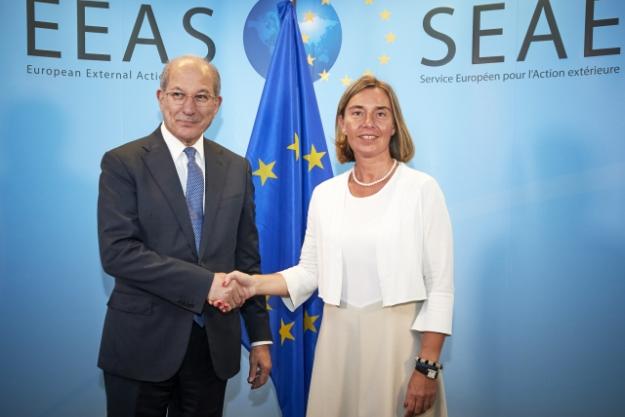
The OPCW Director-General, Ambassador Ahmet Üzümcü, meeting with Ms Federica MOGHERINI, High Representative of the EU for Foreign Affairs and Security Policy.
THE HAGUE, Netherlands— 10 July 2018 —The Director-General of the Organisation for the Prohibition of Chemical Weapons (OPCW), Ambassador Ahmet Üzümcü, met yesterday with the High Representative of the European Union for Foreign Affairs and Security, H.E. Ms Federica Mogherini in Brussels, Belgium.
The Director-General briefed the High Representative on OPCW’s activities in Syria, efforts to address chemical terrorism and implementation of OPCW projects made possible by the support of the European Union (EU). He thanked her for the EU’s substantial financial contributions to the core activities of the OPCW and its operations in Syria. High Representative Mogherini expressed appreciation for Ambassador Üzümcü’s 8-year leadership at the helm of the Organisation. She also underlined the EU’s continuous support of the effective implementation and universalisation of the Chemical Weapons Convention (CWC).
The Director-General and the High Representative both agreed that the CWC regime has been seriously threatened since 2012 by the repeated use of chemical weapons in Syria, Iraq, Malaysia and the UK. High Representative Mogherini reiterated the support of the EU to the decision of the Special Conference of CWC States Parties, adopted on 27 June, as a crucial step towards preserving and upholding the global norm against the use of chemical weapons. She confirmed that the EU stands ready to support the Technical Secretariat of the OPCW and to cooperate with all States Parties to the CWC, with a view to the implementation of this decision.
Ambassador Üzümcü expressed his deep appreciation for the EU’s on-going support for the works of the Technical Secretariat and the goals of the Convention.
Background
As the implementing body for the Chemical Weapons Convention, the OPCW oversees the global endeavour to permanently eliminate chemical weapons. Since the Convention’s entry into force in 1997 – with its 193 States Parties – it is the most successful disarmament treaty eliminating an entire class of weapons of mass destruction.
Over 96% of all chemical weapon stockpiles declared by possessor States have been destroyed under OPCW verification. For its extensive efforts in eliminating chemical weapons, the OPCW received the 2013 Nobel Peace Prize.
